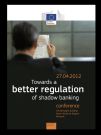News
Shadow banking can seriously damage public wealth

“We keep smoking out of public buildings and cigarette packs carry gruesome health warnings. Regulators should discourage shadow banking in a similar way: restrict it generally and make its effects more transparent”, said UNI Europa Regional Secretary Oliver Roethig. Speaking as a panellist at The European Commission’s Conference on Shadow Banking on 27. April 2012, he argued that in-house shadow banking activities should be kept out of banking serving the real economy. He rejected the argument often brought forward by the banking industry that shadow banking helps to finance the real economy. “Yes we need economy growth, but we don’t need the detour of shadow banking”, Roethig said. Pointing to the upcoming improved regulation on bank’s capital requirements (Basel III, CRD IV), which go in the right direction he argued that banks must always have enough money to finance their business, so that they do not need speculative high-risk operations as the basis for financing the real economy. And saver’s money must never be used for shadow banking activities.
Roethig reminded the conference of the trade union’s position that banking employees must have the right to be trained and informed on the products they are selling. “For us as trade unions in the finance sector, it is important that customers have right to fair advice and that bank employees have the right to give fair advice”, Roethig said.
He suggested introducing a rule that the top members of a bank’s board must not have served in a leading position on the investment banking side for some years. “This would give an extra push to banks putting their function for the real economy first, rather than looking at profits through high-risk speculation”.
Finally, speaking about the regulation of shadow banking seems like a contradiction: If “shadow banking” were regulated, it would be simply “banking”. The other option seems to be having a parallel regime of light regulation. “We would be opposed to such a light regime, especially when it actually extends to 50% of total financial assets. This would be an indication that there is a serious incident of market and regulatory failure”, Roethig concluded.

